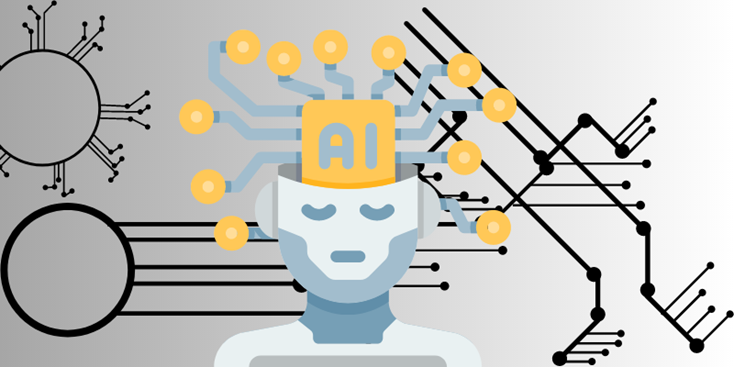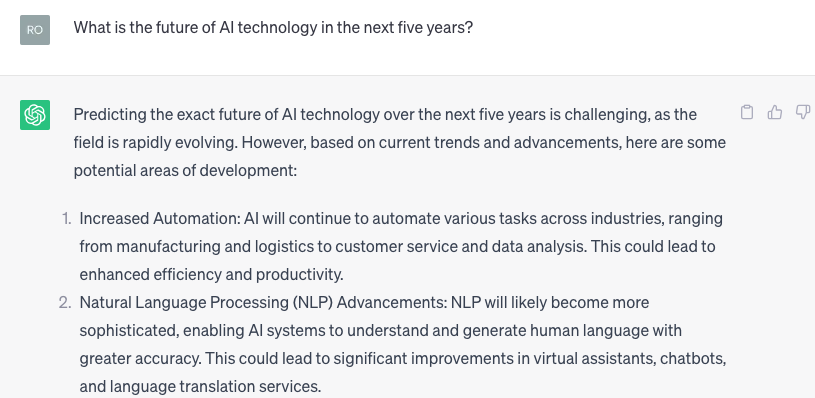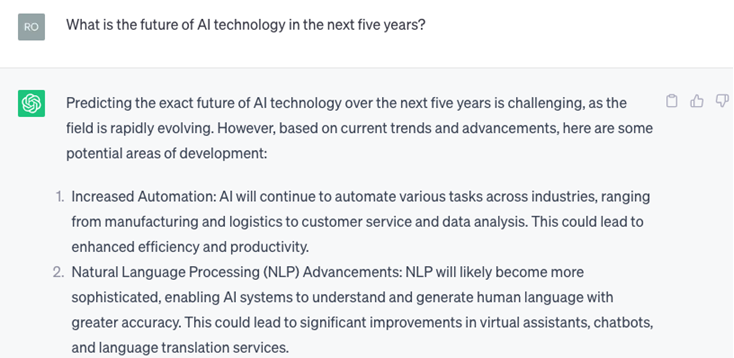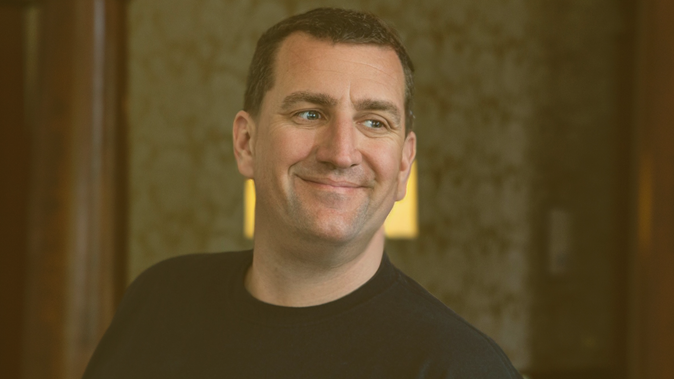4 Ways AI will Transform Work Life for Everyone
 What does the transformative effect of AI hold for the future of employment? While at RecFest we spoke to futurist Matt O'Neill to find out how we should embrace the new tools at our disposal and what will come next...
What does the transformative effect of AI hold for the future of employment? While at RecFest we spoke to futurist Matt O'Neill to find out how we should embrace the new tools at our disposal and what will come next...
The sudden furore around artificial intelligence is inspiring equal amounts of excitement, curiosity and, of course, a generous helping of outright fear.
You can’t move on LinkedIn for posts telling you how to get the most out of ChatGPT, which has become the Harry Styles of the scene - the one everyone knows and likes ahead of all the others.
Similarly, it is absolute manna from Heaven for newspapers and online ‘news’ outlets predicting anything from enslavement by sexy robots to looming biological or nuclear Armageddon. Not to mention what it will do to the rap scene.
So, what’s the truth? Is this, in fact, being written by a robot? And if it isn’t right now, will that be the case in five years’ time?
The easiest thing to do of course is to ask good ol’ ChatGPT. And…it’s a lot. The list of anticipated AI developments includes Increased Automation; Natural Language Processing; Enhanced Personalization; Ethical AI Development; Advancements in Computer Vision; AI in Healthcare; AI and Robotics Integration; and AI Ethics and Regulation.
And you can also add yet more fake Tom Cruises into the mix.
“These are just a few potential areas of growth and development in AI technology over the next five years,” it says. “The actual advancements will depend on various factors, including research breakthroughs, industry demands, and societal considerations.”



What's next in AI?
But hey, we humans are no slouches ourselves and it is generally agreed that for now at least, robots cannot scale the heights of Michelangelo, William Blake, James Joyce, Andy McNab or, of course, Chris Waddle.
Which is why, at the recent RecFest event we collared futurist and AI expert Matt O’Neill to give us the lowdown on what it all means for the HR sector and by proxy, employer branding.
A change is a’coming, he confirms. But it’s by no means all bad news.
“My view is that the future belongs to the hyper productive, and that's what these tools afford people,” says O’Neill. “I think the challenge is, if you're not embracing them and other people are, you're just going to be left by the wayside.
“If your work is systematic, repeatable, or process driven, there's a good chance that those tasks will be automated. So, what I urge anyone who's in the field of, let's call it ‘white collar work’, is to work out how you're going to move yourself up the value chain. Moving away from those repetitive kind of analytical type tasks and moving yourself much more into the human side.”
AI and workforce dynamics
Think not of job losses, he says, but of changing roles in a constantly changing society that is trying to meet various geopolitical, social, and demographic challenges.
“If I was working purely as a recruitment person, the first thing I would do is look to what sorts of problems is society likely to have, because when I look at the sorts of problems that societies are likely to have, that will tell me the sorts of jobs and organisations and businesses that will be set up to solve those problems.
“One of the future jobs I'm talking about in relation to AI, is, and there'll be derivations of this, the Vice President of AI Safety and Compliance. This is a job that I don't think exists yet. But anybody who's working in tech recruitment, I suspect in the next 12, to 18 months, is going to start to be asked to recruit for this.
“It means that we're going to need people who to come into our organisations to protect against bias, to ensure that those avenues are protected, to mitigate risks, because the more agency that we give these algorithms, well, it could be good, but it could also synthesise a virus that wipes out the planet. Another aspect would be ensuring that the algorithms comply with the rules and the regulations that the company put in place. And that will create a whole set of new jobs.
“If I was working in talent recruiting, I would think about what sorts of problems my sector is likely to face. And that will tell me the sorts of jobs that I might be recruiting for.”
“I don't think everybody's going to suddenly lose their jobs, but I suspect that what a lot of firms will do is when certain types of role come up for renewal, they just won't be renewed. And so, I think there's going to be a lot of people going, ‘what the hell just happened?’, because they've trained all their life for that particular role. I think there'll be an urgent need for re skilling, with some of the new skills, and I think a lot of them will be human skills. So, I think empathy is going to play a huge part. Machines aren't very good at that.”
Harnessing the power of AI
Why is empathy going to be important? Perhaps because as people live longer, we're going to have more generations in the workforce, not the current three or four, but maybe five or six. Managers and leaders will need to be able to communicate across different generations.
One thing is for sure, Matt O’Neill is not getting replaced by a robot anytime soon. He churns out opinions and info almost as quick as an AI interface.
Whilst he acknowledges the fears around AI and its effect as an agent of change in the world, he believes that for the world of work and for improving people’s ability to claw back time for themselves, it will be transformational. And like most labour-saving devices it may only free up time for…more labour.
“There will be displacements but there will also be opportunity and that's what I want people to remember and think about.
“Take office work. Where some people have discovered this large language model, they were able to do their job in half the time. So, they start taking on side hustles. And that, to me, is an example of one of my central messages. We want people to get time back to do other things. Maybe it's time to go fishing or use it to load productivity and enhance their careers.”
Oh and if the robots do eventually take over don't expect any help from Matt. He, for one, will be welcoming our new robot overlords as a fan.
“It’s the smartest friend you have ever had, and it never gets bored of listening, he enthuses.”


The truth about CHATs and jobs
Our future gazer makes some predictions about the future of AI…
1. AI isn't coming to take our jobs (in the short term). BUT a human with an AI could be. Those who get curious will find their productivity shoots up. And - the future belongs to the hyper productive.
2. There's a lot of fear about the impact of AI. In part, that's down to science fiction films like the Matrix and Terminator. I suspect we'll see more people wanting to return to offices because:
A) They want to prove their worth. And being present in the minds of leadership is a good start.
B) Proximity bias - If people are close to where decisions are being made, they're more likely to get recognised and promoted. If decisions are made in physical workplaces, they will want to be there.
3. If smartphones were the millennial technology, then AI and Robotics are the tech of Gen A (born 2010-24). It'll be second nature to use it. They'll also be more sensitive about how their data gets used. Businesses will need to be sensitive to that. From a leadership perspective, knowing how to communicate to a generation that won't get 'top-down missives' will be critical. In fact, with more generations in the workplace, a key leadership skill will be understanding how to communicate with the different generations, including gen A.
4. We’re only talking about Generative AI (the current zeitgeist). Expect new models with new capabilities to emerge soon. Get ready for "Synthesising AI", which acts a bit like the head chef of the AI world. It's all about amalgamating multiple sources or types of data to stir up complex insights or whip up predictions. Picture it like AI-powered detective work - analysing data, fueling recommendation systems, or making complex decisions. That will require a new set of skills to work alongside. Ultimately - continual learning is the solution. And before AGI (Artificial General Intelligence), where machines have the equivalency of a human being in all domains, expect 'Chatty', 'Self Sufficient', 'Embodied' and 'Transparent' AI systems.

